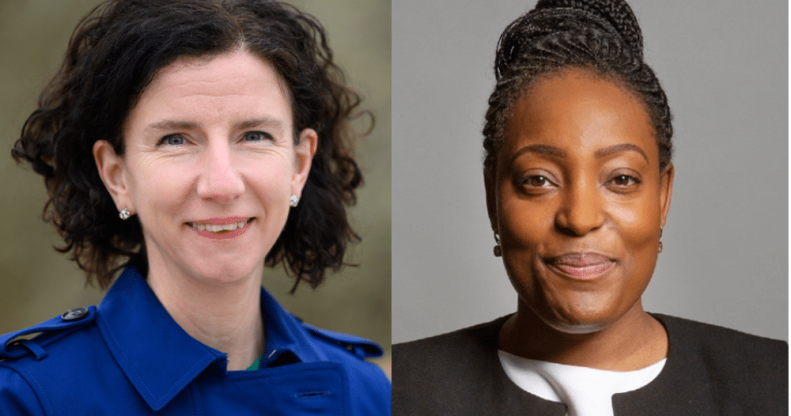Labour names new shadow women and equalities chiefs as Keir Starmer urged to speak on trans rights

Labour’s new women and equalities ministers, Anneliese Dodds and Taiwo Owatemi (Leon Neal/Getty/Facebook)
Labour has named party chair Anneliese Dodds as the new shadow secretary of state for women and equalities after Marsha de Cordova abruptly left the frontbench role.
Dodds will take up the post with immediate effect, while Coventry North West MP Taiwo Owatemi will become shadow minister for women and equalities, replacing Charlotte Nichols who took a leave of absence for personal reasons.
Kier Starmer said he was pleased to appoint Dodds “at what is a vital time in our ongoing campaign for equality”, and welcomed Owatemi as a “great addition” to the team.
Senior Labour insiders told The Guardian they were confident both ministers were firmly pro-trans rights and that their “politics are in the right place” on the subject that has divided the party recently.
Anneliese Dodds has a strong LGBT+ rights record
Dodds was previously a member of European Parliament’s LGBTI Intergroup and has called for greater co-operation on LGBT+ issues across borders, writing passionately on the subject for PinkNews in 2015.
“Some might use the poor LGBTI rights record of some member states to argue that the UK might be better off outside the EU,” she said at the time.
“Why link ourselves in partnership with nations whose reputation for defending the rights of their LGBTI citizens is so disgraceful? I disagree. LGBTI rights don’t stop at borders and it’s only together that we make a real difference.”
She has consistently voted for laws promoting equality and human rights, including same-sex marriage in Northern Ireland.
“I’m delighted to accept the position of Shadow Women and Equalities Secretary, and look forward to maintaining Labour’s proud record of promoting equality,” Dodds said on Tuesday. “Labour is the party of equality – and only Labour in government can deliver a fairer, more equal future for Britain.
“I want to pay tribute to Marsha de Cordova and Charlotte Nichols for the fantastic work they did for those facing discrimination and prejudice, and for holding the Conservative government to account for their appalling failures.”
Taiwo Owatemi has called for an end to HIV stigma and homophobic bullying
Like Dodds, Taiwo Owatemi has also been outspoken in her support for LGBT+ rights. In 2020 she challenged then-Secretary of State Dominic Raab to explain what steps he had taken to discuss with his Polish counterpart alleged human rights abuses against LGBT+ people since the election of President Duda.
She has also called for an end to HIV stigma in Black communities and homophobic bullying in schools, acknowledging that “growing up LGBT+ is still unacceptably tough”.
Owatemi said she was excited to take on her new role as shadow minister for women and equalities. “Championing equality and celebrating who you are goes to the heart of why I first stood to be a Member of Parliament,” she said.
“I am looking forward to working alongside the brilliant Anneliese Dodds as we hold this government and its woeful track record to account and continue to develop Labour’s Race Equality Act.”
The new roles come after Marsha de Cordova stepped down as shadow women and equalities secretary, a decision she said had “absolutely nothing to do” with internal Labour tensions over trans rights.
Nevertheless, The Guardian reports there was some hesitation over who would fill the role, with MPs nervous it would be a “poisoned chalice” that was likely to attract significant criticism.
Keir Starmer is facing pressure to speak out on trans rights and to address the ongoing Rosie Duffield row.
Duffield, the Canterbury MP, has been accused of transphobia over her so-called “gender critical” views. It is understood that she remains the subject of an ongoing investigation.
Duffield has maintained that she is not transphobic and that she supports LGBT+ rights. The issue reached a head last week when she announced she would not attend a Labour conference after receiving advice that her safety could be compromised.
An anonymous MP said that “no one wants to get drawn into fighting with colleagues in public” over Duffield’s comments, but added: “That is not to say we haven’t tried to have conversations in private.”

